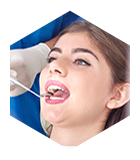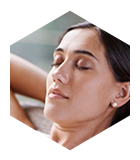Sleep Apnea Therapy — Friendswood, TX
Get the Full Night's Rest You Deserve

Do you feel groggy, tired, or unfocused during the day due to restless nights? You may have sleep apnea—a common sleeping disorder that affects millions of Americans. If you’ve been struggling to get a good night’s sleep, we can help. Dr. James T. Sierra is experienced in sleep apnea therapy, allowing his patients to get the rest and relaxation that they need and deserve. Read on to learn more about sleep apnea therapy in Friendswood, TX and how Dr. Sierra can help.
What is Sleep Apnea?

Sleep apnea, the cessation of breathing for ten or more seconds at a time throughout the night, affects millions of US adults each year. The variety of symptoms associated with this sleep disorder can lead to misdiagnosis and improper treatment. The good news is that once patients are diagnosed with sleep apnea, the treatments are relatively straightforward and typically quite effective in reversing related health concerns. At Friendswood Dental Group, we treat many patients who suffer from sleep apnea, and they’re often surprised to hear the dentist can help. Dr. Sierra has training and experience offering oral appliance therapy for the treatment of sleep apnea.
Symptoms of Sleep Apnea
Before we can offer patients treatment for sleep apnea, they’ll need to receive diagnosis from a trained sleep physician. We can help you determine whether you’re at risk for sleep apnea during a consultation and recommend a sleep physician in the area. Some symptoms to be aware of include:
- Loud, consistent snoring
- Waking frequently at night out of breath or gasping
- Extreme exhaustion during the day
- Waking with dry mouth, sore throat, or headache
- Irritability or mood changes
- Elevated blood pressure
- Lack of concentration, memory loss, and change in behavior
Sleep Apnea Therapy
Once patients are diagnosed with obstructive sleep apnea, we may be able to offer treatment using comfortable, custom crafted oral appliances. These appliances adjust the jaw slightly forward keeping the throat muscles constricted and airway clear throughout the night. Unlike other treatment options, oral appliance therapy is a compact, portable, convenient treatment option. You’ll simply wear it when it’s time for sleep, and you can enjoy easier breathing for more restful nights. This makes it easy to get a good night’s sleep while traveling, and it promotes patients to actively treat sleep apnea instead of letting the classic, bulky, and uncomfortable CPAP machine collect dust.
Another way that you can give yourself a better chance at a full night’s sleep is making certain lifestyle changes. Regular exercise and meditation promote a healthier lifestyle, and if you smoke, quitting can help you breathe more smoothly. There are also alternative sleep apnea treatments like upper air surgery and Nightlase, but the option that works best for you will depend on your specific condition. That’s why it’s important to visit our dental office if you’re having trouble sleeping.
If you have any questions, or if you’re ready to get started on sleep apnea therapy, call our dental office to get the restful nights you need and deserve!
Understanding the Cost of Sleep Apnea Treatment

When you visit us for your consultation, we will be able to share a personalized cost estimate. Although sleep apnea treatment can seem a bit pricey at first, it is a smart investment that could save you money in the long run. Our team wants to make it easy for you to afford your care, so you can expect us to be straightforward about our pricing policies. We can also assist you with filing insurance claims and applying for low-interest financing from a third-party lender.
Does Dental Insurance Cover the Cost of Sleep Apnea Treatment?

Dental insurance is designed to help you maintain or achieve healthy teeth and gums. However, sleep apnea is an airway problem, and although it is indirectly related to dental health in many cases, it is not typically covered by dental insurance. Rather, it is more commonly covered by medical insurance.
Factors That Affect the Cost of Sleep Apnea Treatment

There are two big factors that can influence the cost of your sleep apnea treatment:
- The details of your medical insurance. It is common for medical insurance to pay for at least a portion of the cost of sleep apnea treatment. However, policies vary greatly in their details. Your deductible, copay, and coinsurance may all influence your out-of-pocket expenses.
- The type of treatment you use. CPAP therapy and oral appliances are both popular ways to address sleep apnea. They come at different price points.
Treat Your Sleep Apnea Now to Improve Your Health

At first, getting sleep apnea treatment can seem a bit inconvenient and even expensive. However, it offers benefits that could save you money and preserve your long-term quality of life.
For example, sleep apnea is associated with an increased risk of some serious medical conditions, including hypertension, diabetes, unwanted weight gain, depression and anxiety, dementia, and more. Often, treating such issues is expensive and challenging. By reducing your risk via sleep apnea treatment, you may pay much less in medical bills throughout your lifetime.
Sleep apnea treatment could also reduce your risk of being in an expensive car accident.
Making Sleep Apnea Treatment More Affordable

Our team does not want you to be overly stressed about paying for your treatment, so we are always ready to help you navigate your insurance benefits and file your claims. We also accept financing from third-party companies, including CareCredit, Lending Club, and Compassionate Finance. We will be happy to walk you through the application process; many patients qualify for a payment plan that easily fits into their budget!
Sleep Apnea FAQs
Our Friendswood dental team would love to help you enjoy more rejuvenating sleep via custom oral appliance therapy. Before you see us for a consultation, though, you might want to learn more about sleep apnea and the treatment process. Below, you will find answers to some relevant FAQs. If your specific questions are not included here, give us a call. Our friendly staff will be happy to speak with you.
Does Everyone Who Snores Have Sleep Apnea?
Snoring is the noise that occurs when tissues in the airway vibrate as air pushes past them. In some cases, those same tissues can completely block the airway, leading to the pauses in breathing that are characteristic of obstructive sleep apnea (OSA). Hence, these two conditions often go hand in hand.
However, it is important to note that snoring does not always mean that someone has sleep apnea, and a lack of snoring does not always mean that someone is enjoying healthy sleep. The best way to find out if you have OSA is to request a sleep test from your medical team.
Can I Diagnose Sleep Apnea on My Own?
Sleep apnea is not self-diagnosable. It can only be officially diagnosed after a sleep test that is supervised by a qualified medical professional.
However, you can and should monitor the quality of your sleep so you can determine if you should request a sleep test. You can even keep a sleep journal to show to your doctor. Some things that you may choose to record include:
- Bedtimes and wake times
- How often you wake up during the night
- Whether or not your partner observes snoring or pauses in breathing
- How you feel upon waking up each morning
- Daily habits that can affect sleep quality, such as alcohol and caffeine consumption
You could also use an app on your smart device to help you monitor your sleep.
Will My Sleep Apnea Go Away If I Lose Weight?
In some cases, sleep apnea is caused by excess fat around the neck and abdomen; the fatty tissue can place pressure on the airway and contribute to breathing problems. If that is true in your case, weight loss could reduce or even eliminate your OSA symptoms. Often, even losing just 10 or 20 pounds can have positive effects for sleep quality.
Of course, weight loss does not guarantee improvements in sleep apnea. OSA can be caused by a range of factors, some of which have nothing to do with body weight.
How Soon After Starting Sleep Apnea Treatment Will I Notice Improvement?
Many patients notice that they feel better after just one or two nights of using their custom oral appliance. (Some people find that it takes them a few weeks to adjust to their treatment, so patience is in order.)
After a few weeks or months of consistent use, you might find that you have more energy, feel more emotionally stable, and are enjoying an improved overall quality of life.
Your general physician or our team might recommend that you undergo a second sleep test after you have been using your treatment for a while. It can provide specific data on the effectiveness of your oral appliance.

 Checkups
Checkups Dental
Dental 3-on-6™
3-on-6™ Cerec® Same-Day
Cerec® Same-Day Full Mouth
Full Mouth Invisalign®
Invisalign® Cosmetic
Cosmetic Sedation
Sedation